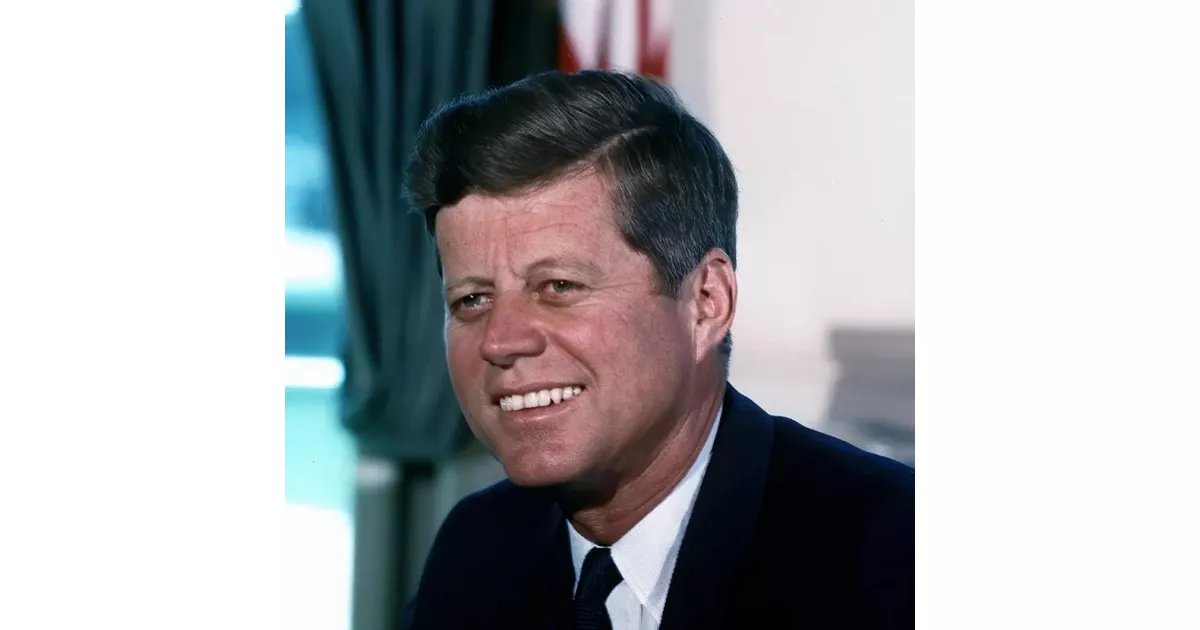A success timeline featuring the most significant achievements of John F. Kennedy.
John F. Kennedy (JFK) was the 35th U.S. President, serving from 1961 until his assassination in 1963. The youngest person elected president, he led the nation during the Cold War, focusing his foreign policy on relations with the Soviet Union and Cuba. A Democrat, Kennedy previously represented Massachusetts in both the House and Senate.
June 1935: Graduation from Choate
In June 1935, Kennedy graduated from Choate, finishing 64th of 112 students. He was the business manager of the school yearbook and was voted the "most likely to succeed."
1946: Election to the House of Representatives
In 1946, Kennedy defeated his Republican opponent in the general election, taking 73 percent of the vote and winning a seat in the House of Representatives.
1952: Election to the Senate
In 1952, Kennedy narrowly defeated Henry Cabot Lodge Jr. by 70,000 votes for the Senate seat. The following year, he married Jacqueline Bouvier.
1956: Publication of Profiles in Courage
During his convalescence in 1956, Kennedy published "Profiles in Courage", a book about U.S. senators who risked their careers for their personal beliefs.
1957: Pulitzer Prize for Biography
In 1957, Kennedy won the Pulitzer Prize for Biography for his book "Profiles in Courage".
1958: Re-election to the Senate
In 1958, Kennedy was re-elected to the Senate, defeating Republican opponent Vincent J. Celeste with a significant margin, marking the largest winning margin in Massachusetts politics history.
1960: Presidential Election Victory
In 1960, Kennedy ran in the presidential election, narrowly defeating Richard Nixon to become president.
1960: Building Support for Presidential Campaign
In 1960, Kennedy traveled extensively to build support for his presidential campaign, employing a strategy to win primaries and demonstrate electability, proving a Catholic could win popular support.
January 20, 1961: Inauguration as 35th President
On January 20, 1961, Kennedy was sworn in as the 35th President of the United States, delivering his inaugural address which called for civic action and global cooperation against tyranny, poverty, disease, and war.
March 6, 1961: Kennedy Signs Executive Order 10925
On March 6, 1961, Kennedy signed Executive Order 10925, mandating affirmative action by government contractors to ensure equal employment opportunities regardless of race, creed, color, or national origin. The Executive Order established the President's Committee on Equal Employment Opportunity.
September 1961: Interstate Commerce Commission Rules in Favor of Justice Department Petition
In September 1961, the Interstate Commerce Commission (ICC) ruled in favor of the Justice Department's petition to adhere to federal law regarding segregation on interstate transportation.
1961: Economic Expansion Begins Under Kennedy
From early 1961, the GDP expanded by an average of 5.5% during Kennedy's presidency, with steady inflation and eased unemployment.
1961: Awarded the Laetare Medal
In 1961, John F. Kennedy was awarded the Laetare Medal by the University of Notre Dame, which is considered the most prestigious award for American Catholics.
1961: Creation of the Peace Corps
In 1961, Kennedy initiated the Peace Corps with Executive Order 10924, appointing Sargent Shriver as its director. This program involved American volunteers assisting developing countries in various fields.
1961: Kennedy Passes Legislation and Proposes Federal Educational Aid
In 1961, Kennedy successfully passed a bill increasing the federal minimum wage to $1.25 an hour, though it exempted laundry workers. He also secured passage of the Area Redevelopment Act and the Housing Act of 1961, providing funds for economically struggling regions and urban renewal. Kennedy proposed a bill for $2.3 billion in federal educational aid, but it was defeated in the House. A health insurance bill and a bill to establish the Department of Urban Affairs and Housing were also unsuccessful in 1961.
1961: Congressional Support for NASA Funding
In 1961, members of Congress were strongly supportive of the Apollo program and approved a major increase in NASA's funding.
1961: Paul White Award
In 1961, the Radio-Television News Directors Association presented Kennedy with its highest honor, the Paul White Award, in recognition of his open relationship with the media. He also asked for them to be broadcast live and made good use of the medium.
November 20, 1962: Kennedy Signs Executive Order 11063
On November 20, 1962, Kennedy signed Executive Order 11063, which prohibited racial discrimination in federally supported housing.
March 1963: Peace Corps Expansion
By March 1963, the Peace Corps had grown to 5,000 members, demonstrating the rapid expansion of the program initiated by Kennedy to aid developing countries.
June 10, 1963: "A Strategy of Peace" Speech
On June 10, 1963, Kennedy delivered the commencement address at American University, also known as "A Strategy of Peace", outlining a plan to curb nuclear arms and pursue world peace amid the Cold War.
June 11, 1963: Kennedy Intervenes in University of Alabama Segregation
On June 11, 1963, Kennedy intervened when Alabama Governor George Wallace blocked the doorway to the University of Alabama to prevent two Black students from attending. Wallace yielded only after being confronted by Deputy Attorney General Nicholas Katzenbach and the federalized Alabama National Guard. Kennedy then delivered his Report to the American People on Civil Rights speech, proposing civil rights legislation.
June 1963: Visit to West Germany and West Berlin
In June 1963, Kennedy traveled to West Germany and West Berlin to reinforce the U.S. alliance, giving a public speech in West Berlin on June 26, criticizing communism and reiterating American commitment to Germany, famously saying "Ich bin ein Berliner".
June 1963: Kennedy Proposes Guarantees to Become Federal Law
In June 1963, the guarantees Kennedy proposed in his speech became federal law when President Johnson signed the Civil Rights Act.
June 26, 1963: Visit to Ireland
Beginning on June 26, 1963, during his four-day visit to his ancestral home of Ireland, Kennedy accepted armorial bearings, received honorary degrees, attended a State Dinner in Dublin, and was conferred with the freedom of several towns and cities.
September 23, 1963: Senate Approval of Nuclear Test Ban Treaty
On September 23, 1963, the U.S. Senate approved the limited treaty prohibiting atomic testing on the ground, in the atmosphere, or underwater.
October 7, 1963: Kennedy Signs Nuclear Test Ban Treaty
On October 7, 1963, Kennedy signed the limited nuclear test ban treaty, which prohibited atomic testing on the ground, in the atmosphere, or underwater, but not underground.
1963: Sustained Economic Growth Continues
In 1963, the sustained rate of growth in GDP and industry continued under Kennedy's presidency.
July 2, 1964: Civil Rights Act Signed into Law
On July 2, 1964, the guarantees Kennedy proposed in his June 1963 speech became federal law when President Johnson signed the Civil Rights Act.
1964: Civil Rights Act of 1964 Proposals
In 1964, Kennedy's proposals of equal access to public schools, other facilities, and greater protection of voting rights became part of the Civil Rights Act of 1964.
July 20, 1969: Apollo 11 Moon Landing
On July 20, 1969, Apollo 11 landed the first crewed spacecraft on the Moon, almost six years after Kennedy's death.
2010: Gallup Organization Survey
In 2010, a Gallup Organization survey revealed that Americans considered John F. Kennedy the most popular modern president, giving him an 85 percent retrospective approval rating.
2014: Washington Post Survey
In 2014, a Washington Post survey of the American Political Science Association ranked Kennedy 14th highest overall among presidents but also identified him as the most overrated U.S. president.
2017: C-SPAN Survey
In 2017, a C-SPAN survey ranked Kennedy among the top ten presidents.
2023: Gallup Survey
A 2023 Gallup survey showed Kennedy with a retrospective approval rating of 90 percent, the highest of all U.S. presidents in recent history.
Mentioned in this timeline

Jupiter is the fifth and largest planet from the Sun...

Martin Luther King Jr was a pivotal leader in the...

The White House located at Pennsylvania Avenue NW in Washington...

Marilyn Monroe was an iconic American actress and model who...

The stock market is where buyers and sellers trade stocks...
The Union of Soviet Socialist Republics USSR existed from to...
Trending

49 minutes ago Eddie Vedder's vulnerability shines in 'Matter of Time,' activism and EB research highlighted.
49 minutes ago Gold and Silver Market: Conflict and Uncertainty Impact Prices, ETF Investment Advised.
2 hours ago Smoothie King Employees Fired for Refusing Service to Customer Wearing Trump Hoodie.

2 hours ago Sydney Sweeney stuns fans with daring lingerie and tights poses for Syrn.

2 hours ago Justin Timberlake Sues to Block Release of DWI Arrest Video in Sag Harbor

2 hours ago Josh Duhamel Opens Up About His Divorce with Fergie, Expresses No Regrets.
Popular

Jesse Jackson is an American civil rights activist politician and...

Hillary Diane Rodham Clinton is a prominent American politician lawyer...

Jim Carrey is a Canadian-American actor and comedian celebrated for...

XXXTentacion born Jahseh Dwayne Ricardo Onfroy was a controversial yet...

Michael Joseph Jackson the King of Pop was a highly...

Bill Clinton served as the nd U S President from...
